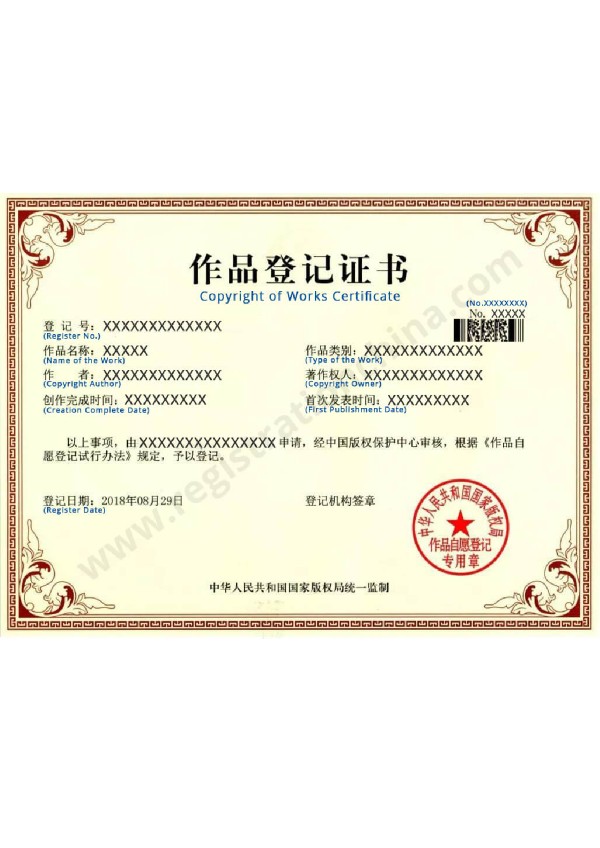Contents
As the global digital era evolves, the forms of creative works have become increasingly diverse, including text, images, audio, video, and data across multiple media. Although the Copyright Law stipulates that works are automatically protected upon creation, copyright registration remains an essential legal tool, providing strong evidentiary support and commercial value.
For foreign clients conducting business in the Chinese market, securing works’ copyrights efficiently and legally is a crucial step. This article provides a comprehensive guide covering legal foundations, registration procedures, detailed insights into work categories, and how to Protect Your Copyright in China for foreigners.
Legal Background and Importance of Copyright Protection in China
According to the Copyright Law of the People’s Republic of China, any literary, artistic, or scientific work that is original and expressed in a fixed form is automatically protected. However, copyright registration plays a vital role in legal enforcement and business credibility.
Copyright registration provides evidentiary value, as a registration certificate serves as initial proof in infringement disputes, reducing the burden of evidence and strengthening the copyright holder’s legal claims. It also enhances commercial credibility by demonstrating the legal status of a work, fostering trust among business partners and investors.
While copyright protection is granted upon creation, a registered copyright certificate can serve as key preliminary evidence in civil litigation.
A case example illustrates this. A photographer finds that a Chinese online platform has republished several of their photographs without authorization. The photographer files a copyright infringement lawsuit and submits their China Copyright Center registration certificate as evidence. The certificate contains details such as the work’s title, creation date, author identity, and registration date.
During the trial, the court acknowledges the initial evidentiary effect of the registration certificate. Unless the opposing party provides sufficient counter-evidence, it is presumed that the photographer owns the copyright. Ultimately, the court upholds the copyright claim, rules that the platform infringed, and orders compensation to the photographer.
For foreign clients operating in China, copyright registration not only legally confirms ownership but also acts as a deterrent against infringement, strengthening market competitiveness.
Differences Between U.S. and Chinese Copyright Registration Systems
Understanding the differences between the U.S. and Chinese copyright systems is essential for foreign rights holders.
The United States Copyright Office follows a unified system, applying the same registration process to all creative works, including literary, artistic, and software-related works. However, while software is protected under copyright law, certain technical innovations within software may qualify for patent protection through the United States Patent and Trademark Office. These two protections are independent and serve different purposes.
In contrast, China differentiates between two major types of copyright registration. The Work Registration Copyright Certificate applies to literary, artistic, audio-visual, and other creative works, while the computer software registration certificate is specifically for software programs and requires the submission of source code, technical documentation, and functional descriptions.
This classification allows for more precise regulatory review, ensuring that different types of intellectual property are protected under appropriate legal frameworks. Understanding these distinctions enables foreign clients to choose the correct registration category, prepare the required materials, and avoid rejection due to misclassification.
Real-Name Authentication Requirements for Copyright Registration in China
China’s copyright registration is primarily handled through the China Copyright Protection Center via its official website.
Applicants must select either works registration or computer software registration based on the nature of their creation. The system then prompts users to upload supporting materials.
Under current regulations, the China Copyright Protection Center requires real-name authentication using a China-registered mobile number.
Domestic applicants, as well as individuals and businesses in China, can use a verified Chinese mobile number for authentication. If no Chinese mobile number is available for Foreigners, direct online registration is currently not possible.
Recommended solutions include seeking assistance from a trusted contact in China, such as a business partner or friend, who can help with verification. Another option is to use a professional agency, such as Diligent & Integrity Law Firm, which can act as an authorized agent and assist with real-name authentication using verified credentials.
Tips:
The current China Copyright Protection Center system does not allow foreign applicants to register directly without a China-verified mobile number, a measure implemented to enhance identity security.
Definition and Scope of Works Copyright in China
Under Chinese law, a work refers to intellectual creations with originality, expressed in a fixed form, across various fields such as literature, art, and science. Key categories include written works such as novels, essays, poetry, and news articles; artistic works such as paintings, sculptures, and photography; audio-visual works such as films, TV series, music, and radio broadcasts; and new digital works, including software, databases, online content, and multimedia art generated using new technologies.
A legal Case:
A Chinese online platform republished multiple works by a British photographer without authorization, prompting the photographer to file a lawsuit for copyright infringement. The photographer initiates a copyright infringement lawsuit and presents a China Copyright Center registration certificate as evidence.
During litigation, the court accepts the registration certificate as preliminary proof of ownership. Since the defendant fails to provide counter-evidence, the court recognizes the validity of the photographer’s copyright claim and orders the platform to compensate for damages.
This case underscores why foreign creators seeking copyright protection in China should register their works locally to ensure enforceability in legal proceedings.
Your Trusted Partner in Copyright in China
As a law firm specializing in intellectual property protection and digital evidence solutions, BeGood Law Firm offers expert legal services in international copyright matters. Our key strengths include comprehensive online protection, monitoring copyright compliance across global digital platforms, and expertise in text, images, audio, and video copyright, providing tailored legal advice for media professionals and digital creators.
We also provide data cleansing and blockchain evidence storage, using advanced technology to create verifiable, immutable records of copyright ownership. Our registration and evidence collection methods are widely accepted in courts worldwide, offering judicially recognized and flexible solutions. With a global computing infrastructure, we manage cross-border intellectual property rights efficiently.
We provide a one-stop solution for foreign clients seeking copyright protection in China and beyond, ensuring your creative work remains legally secure in the digital era.





